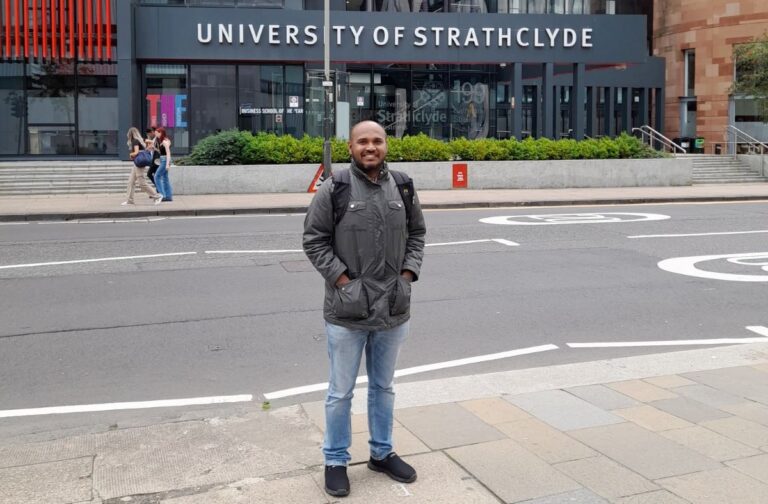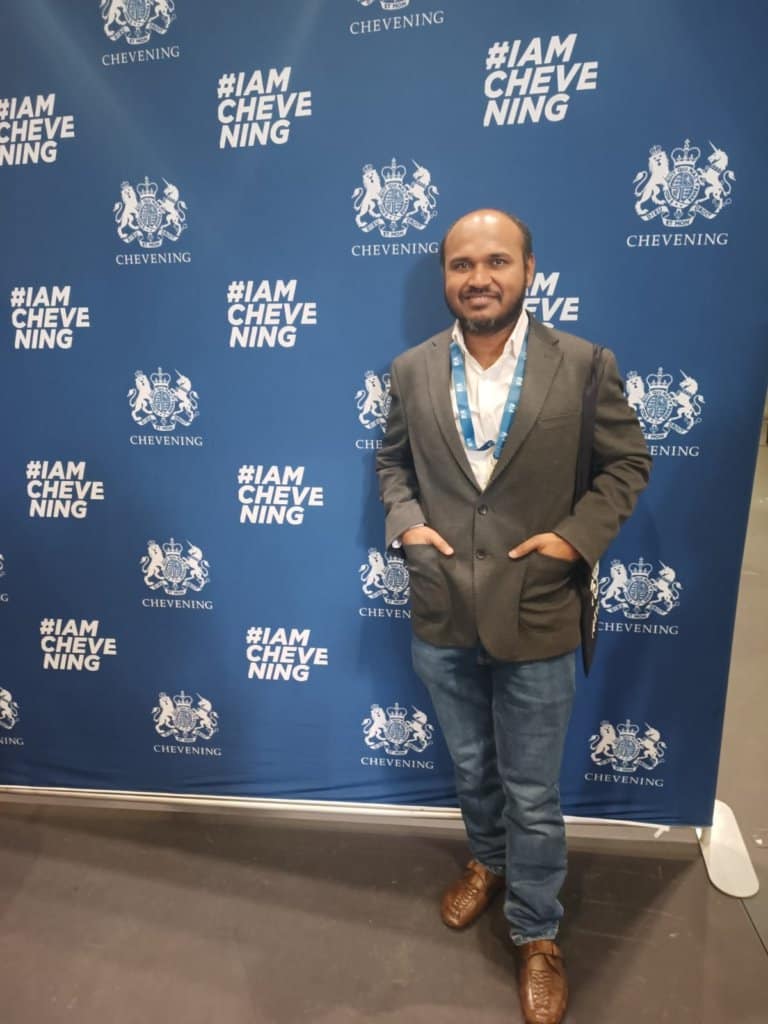
Sometimes, you have to leave home and everything you love to build a better future. That’s what Laxdip Pendharkar did four months ago. Funded by the Chevening Scholarship, he said goodbye to his 10-month-old daughter to pursue the MSc Social Innovation and Entrepreneurship at the University of Strathclyde.
“My daughter understood that I was going away and was so excited to come to me. When the train was about to leave, she said bye to me,” says Pendharkar. “After my departure, she used to look for me. She could not tell but my wife could understand she was looking for me. Now she has started speaking a few words so she tries to communicate on video calls.”
These days, Pendharkar is feeling proud seeing Ratan Tata (the founded of India’s largest business conglomerate) taught as an innovation case study, joining events on how automation will affect the future of work and meeting other scholars in various fields like social work, politics, entrepreneurship, technology, finance, energy, and climate — in one university alone.
It’s been a rollercoaster transition from working with India’s rural consumers to studying on a campus of 23,000 students from over 100 countries. We caught up with Pendharkar to learn more about why he left India, how he won the prestigious Chevening Scholarship and how he plans to make a difference with it:
1. How did you find out about the Chevening Scholarship?
The broader scope of the Chevening scholarship was introduced to me by a Chevening alumni Mr. Raju Kendre, who was in my LinkedIn network earlier. Now we have became good friends.
2. Can you detail the application process from start to end please? If you could describe this process in one word, what would it be and why?
The application deadline was November 2, 2021. I had to draft and submit four essays: Leadership, Networking, Study in UK, and Career Plan.
The leadership essay should demonstrate your leadership skills which includes what leadership means in your own words and a couple of events where you successfully demonstrated your leadership qualities with desired outcomes.
The Network essay should demonstrate your professional relationship building skills along with certain events where you used networking skills to achieve your goals. You should give ideas on how you are going to use these networking skills in future.
The Study in UK essay should clarify your top three chosen universities, reasons behind choosing them and specific points on why you chose the UK.
The Career Plan essays should include your short-term and long-term goals. It should also clarify how you plan to contribute to the development of your home country, engagement with the Chevening community, and engagement with UK initiatives in your home country.
For shortlisted applicants, the next milestone is a face-to-face interview which happens between February to April, generally.
In one word I would describe this process as “self-analysis.” The Chevening application gives you an opportunity to analyse yourself in terms of your skills, competencies, and experiences which help to define your career plan precisely.
3. What was the easiest and hardest part of the application process?
Believe me when I say there is nothing called “easy” in the Chevening application. So, for the sake of comparison, I would rather talk about the less difficult and hardest part of the Chevening application.
The less difficult part was talking about my networking skills as my work experience revolves around the development of a village-level network of entrepreneurs.
The hardest part was synchronising the career plan with home country development, UK in India initiatives, and Chevening community engagement. I had to do very detailed research before drafting the career plan essay.
4. Why did you choose to further your studies in the UK? Why not in your home country?
The best benefit of studying in the UK is global exposure which gives me an opportunity to build a meaningful global network. Also, in the U, one gets the opportunity to study under the world’s top lecturers along with students coming from a diversity of backgrounds, cultures, countries, experiences, etc. So, I can say UK universities have the best combination of global-level knowledge and network.
5. What has been your most memorable academic experience in the UK and at the University of Strathclyde so far?
Working in a group at the University of Strathclyde to complete an assignment. It was great to exchange knowledge and experience with six people from different countries.

Despite only being there for four months, Laxdip Pendharkar has made eight close friends from eight different countries at the University of Strathclyde and a lot of headway towards building a more innovative India. Source: Laxdip Pendharkar
6. What has been your most memorable non-academic experience in the UK so far?
So far, eight people from eight different countries have become my close friends. In terms of a professional network in the UK then this number goes up to 100s.
7. What has been the most emotional part of your Chevening journey so far?
Staying away from family, especially from my one-year-old daughter. It is hard but something I need to do for myself and my country.
8. How do you plan to make a difference with your degree from the University of Strathclyde?
My vision is to start an EdTech firm for fostering entrepreneurship education among India’s youth to give them more opportunities. A UK degree will help me design the course content and build relevant networks and partnerships with like-minded people and organisations.
As per my findings, the biggest problem of young entrepreneurs is a “fear of failure.” This fear of failure is because of a lack of proper knowledge, mindset, finance and network. I have envisioned equipping youth with proper knowledge and network which would support them in their entrepreneurial journey.
My target demographic would be young people, especially women, from small towns in India who have aspirations but have negligible access to knowledge and network. The business can be of any innovative idea.
I will design the course content in a way that would provoke the entrepreneur to think of innovative business ideas with the help of mentors (mostly Chevening scholars) and how they can present to a network of potential investors. I have a plan to build a network of investors at the same time as well.
9. What do you like and dislike most about the UK?
I like that in the UK, people are aware of and comply with British values. Here the people and the government respect diversity, equality, and inclusion.
What I don’t like is the accommodation crisis in the UK. It is very difficult to search and secure accommodation in the UK, especially for students who are not working and don’t have documented income or guarantor.
10. Tell us more about your top achievements with Eklavya and 1Bridge.
1Bridge is a social enterprise working on fulfilling the aspirations of rural consumers in terms of products and services through a large network of Village Level Entrepreneurs. I joined 1Bridge in 2017, and during my five-year tenure, I worked on several rural development and women empowerment projects. A few of my achievements include a project in rural Karnataka mobilising over 300 women Sathis and educating 140,000 rural beneficiaries on internet usage.
The Eklavya India movement is working on democratising higher education opportunities along with developing grassroot-level leadership. I joined Eklavya as a volunteer mentor in July 2022. My key achievements include an introduction session for aspirants to raise awareness about the Chevening scholarship and processes. The session video is still available on youtube which has more than 2,400 views. You can find it here.
I have personally mentored a couple of Chevening applicants throughout the application process and helped several applicants finetune their drafts. Due to a high number of requests, I have also conducted a session on the Chevening application process.